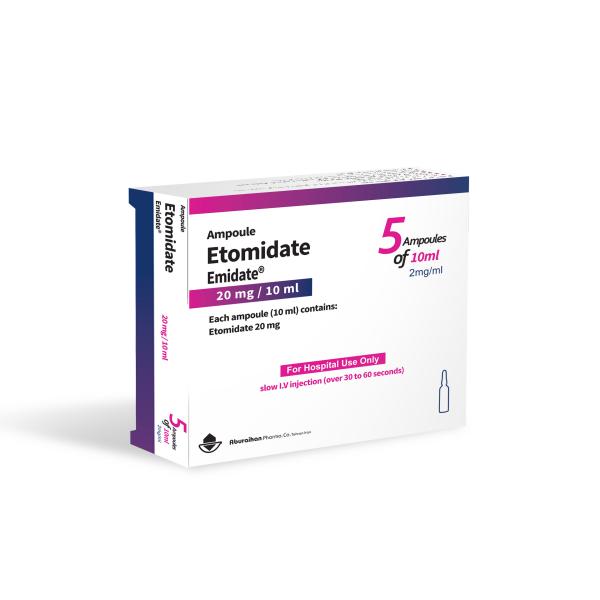Emidate®
Etomidate
20mg/ 10 ml Ampoule
General anesthesia: Induction of general anesthesia; as a supplement to subpotent anesthetic agents during maintenance of anesthesia for short operative procedures (eg, rapid sequence intubation, dilation and curettage, cervical conization).
Mechanism of Action:
Ultra-short-acting nonbarbiturate general anesthetic (benzylimidazole) used for rapid induction of anesthesia with minimal cardiovascular effects; produces EEG burst suppression at high doses.
Method of Administration:
General anesthesia:
IV: Initial: 0.3 mg/kg (range: 0.2 to 0.6 mg/kg) over 30 to 60 seconds for induction of anesthesia.
Procedural sedation (off-label use): IV: Initial: 0.1 to 0.2 mg/kg, followed by 0.05 mg/kg every 3 to 5 minutes as needed.
Rapid sequence intubation outside the operating room (induction): Note: Provides no analgesic effects.
IV: Initial: 0.3 mg/kg; consider 0.2 mg/kg in hemodynamically unstable patients
Notes
Contraindications:
Hypersensitivity to etomidate or any component of the formulation
Interactions:
Metronidazole Systemic: May enhance the adverse/toxic effect of Products Containing Propylene Glycol. A disulfiram-like reaction may occur. Risk X: Avoid combination
Pregnancy and Lactation:
Etomidate crosses the placenta.
Based on animal data, repeated or prolonged use of general anesthetic and sedation medications that block N-methyl-D-aspartate receptors and/or potentiate GABA activity may affect brain development. Evaluate benefits and potential risks of fetal exposure to etomidate when duration of surgery is expected to be >3 hours
It is recommended that caution must be exercised when administering etomidate to breastfeeding females; however, use is considered acceptable
Warning and Precaution:
- Heart failure: In a scientific statement from the American Heart Association, etomidate has been determined to be an agent that may exacerbate underlying myocardial dysfunction
- Renal impairment: Risk of toxicity is greater in patients with renal impairment; use with caution and monitor renal function.
Special populations:
- Elderly: May induce cardiac depression in elderly patients, especially those with hypertension; may require lower doses.
- Pediatric neurotoxicity: In pediatric and neonatal patients <3 years and patients in third trimester of pregnancy (ie, times of rapid brain growth and synaptogenesis), the repeated or lengthy exposure to sedatives or anesthetics during surgery/procedures may have detrimental effects on child or fetal brain development and may contribute to various cognitive and behavioral problems. Epidemiological studies in humans have reported various cognitive and behavioral problems, including neurodevelopmental delay (and related diagnoses), learning disabilities, and ADHD. Human clinical data suggest that single, relatively short exposures are not likely to have similar negative effects. No specific anesthetic/sedative has been found to be safer. For elective procedures, risks versus benefits should be evaluated and discussed with parents/caregivers/patients; critical surgeries should not be delayed
Adverse Reactions:
Myoclonus, Adrenal suppression, Nausea, vomiting (on emergence from anesthesia), Pain at injection site, musculoskeletal disease (transient skeletal movements), Nystagmus
Storage:
Store below 30 and protect from light and moisture.

